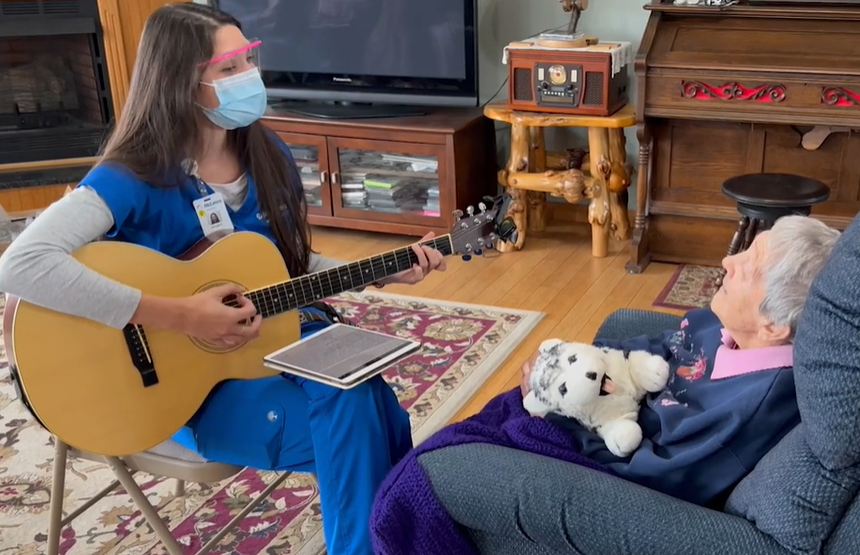Author: Lindsey Ulrich

"Music therapy uses different interventions to accomplish non-musical goals. It's like physical therapy without the stretchy bands. instead you use guitars, drums, relaxation interventions, and more."
Music has a powerful place in our lives, at all stages of life. Within hospice care, music therapy can be used to help patients relax, as well as to manage anxiety, depression, and even pain management.
Taylor Parker, MT-BC, music therapist with McLaren Hospice Lansing, knows music therapy can be used in many situations, but to her, it has its own special importance in hospice care.
“Music care in hospice is more of an enhanced comfort, quality-of-life focused therapy,” said Parker. “Music therapy uses different interventions to accomplish non-musical goals. It’s like physical therapy without the stretchy bands. Instead, you use guitars, drums, relaxation interventions, and more.”
To become a practicing music therapist, Parker studied for four years at Western Michigan University to achieve her music therapy degree, then completed a six-month internship at Trustbridge Hospice in West Palm Beach, Florida where she learned how to combine counseling skills into music therapy. She then passed a board certification exam, completing her requirements.
Now, Parker treats patients with an individualized service to fit each McLaren Hospice patient’s needs. Her therapy begins the moment she enters a patient’s home or room, as she determines which interventions will be most appropriate by analyzing the patient’s current state and needs.
“When I go into a visit, I am paying most attention to how the person is presenting,” said Parker. “If I go in and someone is screaming in pain, the last thing I’m going to do is something relaxing, because it’s not going to grab their attention. It seems counterproductive, but I might go in and play a song that is very loud. You want to completely pull them out of whatever their world is.”
To help a patient in a situation where they are unable to relax, Parker varies how music is played to create a calming effect.
“If I’m helping someone relax, I’ll slowly reduce the amount of stimulation that their body will intake,” said Parker. “I might start with lots of guitar strings, then play less and less. You might just hear your two notes after a while, with no harmony. You want to get quieter and quieter; it helps the patient feel a little bit calmer and more peaceful.”
After each session, Parker asks the patient how the music made them feel, noting that many patients are unaware of their emotion toward the experience until asked. “Usually, they’ll tell me they feel relaxed, they feel happy,” said Parker. “Or, they just say, ‘I feel good!’”
Parkers’ hospice music therapy benefits more than her patients. Her patients’ families are often involved with the process as well as moved by her therapy and its results.
“I get a lot of feedback from families. Usually, it’s gratitude for me coming and spending time with them, and for explaining what I’m doing behind the scenes, because music therapy is kind of foreign to a lot of people, and they may not know what I’m doing or why I’m doing something,” said Parker.
Diana and Ken Smith, daughter and son-in-law to Juanita Messeroll, McLaren Hospice patient, are often engaged with their mother’s music therapy.
“Taylor has definitely brought brightness and joy to Mom. It’s just heartwarming to see mom’s reaction,” said Diana Smith. “It’s for Juanita, but it’s also for us too. I try not to be gone if I can help it, so I can listen in the background,” said Ken Smith.
Parker is currently employing emotionally charged music therapy that benefits patients and their families—both during her sessions and after patients pass on. Utilizing heartbeat recordings of the patient, and co-writing songs or letters with the patient, Parker creates an impactful therapy for the patient and a meaningful keepsake for their families.
“Writing an original song—or a legacy song, as we call it—with a patient about their life or about something they want to focus on or express really generates a lot of nostalgia and joy,” said Parker. “Most importantly, it helps our patients and their families feel good and make the most of their time together.”
As a music therapist at McLaren Hospice, Parker works as part of an interdisciplinary team committed to supporting patients and their families during their most difficult time.
“To work with people who genuinely want to see success in every area—it’s exciting. It makes you want to do other things. It makes you want to grow and push for more, to try each day,” she said.
A compassionate, supporting team is vital to quality hospice care, and one Parker is proud to be part of at McLaren’s, where her craft is recognized by her colleagues as impactful and a difference-maker in their patient care.
“I want people to understand medical music therapy is not entertainment; it’s much more intentional,” said Parker. “This is a therapy and a profession that makes a noticeable impact on our patients, and I’m proud to deliver.”